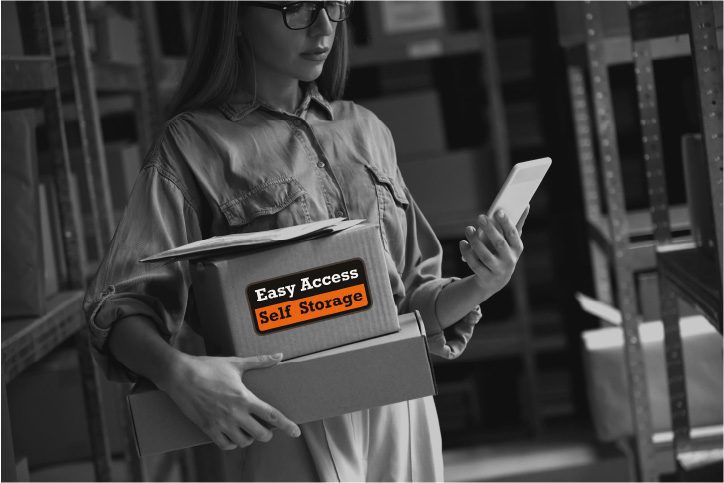
How Automation and Big Data Are Disrupting the Self-Storage Sector
How Automation and Big Data Are Disrupting the Self-Storage Sector
It seems as though the world is gallivanting towards a fully automated, data-rich, AI-driven society. No sector is immune to disruption, and this includes the self-storage sector.
The last decade has witnessed a significant technological evolution that shows no signs of slowing down. Big data, automation, and AI are increasingly viewed as essential tools to drive operational performance, improve tenant experience, increase occupancy, and ultimately take the industry to the next level.
This isn’t a surprise to anyone in the know. Like many industries, the self-storage sector was impacted by COVID-19, and now that the dust has settled, those operating in the space have one eye on the future and how to leverage technology to optimise operational performance.
But what does that mean? Let’s examine how automation and big data are disrupting the self-storage sector.
Self-Storage Automation: Why It’s Important
When done right, self-storage automation allows businesses to leverage data more effectively, adopt agile workflows, and meet the needs of a rapidly changing commercial environment. Networks, devices, data files, and applications can all be used to manage self-storage resources and optimise performance.
There are several key benefits that self-storage businesses can take advantage of when they choose to adopt automation. These include:
- Efficient Scalability: the more data volume grows the more challenging manual storage management becomes. Automation can help IT teams scale their storage infrastructure without the expense, time, and hassle of having to hire and, potentially, train additional employees.
- Improved Efficiency: automation allows IT teams to perform routine tasks with greater accuracy in a shorter period of time. This reduces any managerial emphasis, saves time, and redirects employee talent to more intricate actions.
- Enhanced Trust and Reliability: IT teams can reduce the risk of human error by automating storage management duties, therefore negating data loss, system downtime, and additional issues.
- Better Cost Management: by optimising storage resources through automation, businesses can make better future investments, addressing where the need is greatest and most beneficial.
How does storage automation work?
Storage automation has one clear purpose: to assist IT teams to streamline storage management tasks, allowing them to focus on strategic objectives while improving operational IT efficiency. Businesses adopt a range of tools to automate various storage management tasks, including:
- Provisioning: from allocating storage capacity to setting new storage volumes and access controls, automation optimises supply efficiency and distribution.
- Monitoring: automation makes it easy for businesses to monitor storage volume and performance; this allows IT teams to identify issues before they become large-scale problems.
- Backup: schedule or execute backup recovery operations automatically to reduce the risk of data loss in the event of a system failure or other disaster.
- Data migration: use storage automation tools to move data between different devices or systems; this allows organisations to optimise their storage infrastructure and reduce costs.
- Policy Management: allow organisations to enforce storage policies, including retention periods, access controls, and data encryption, while ensuring that data is used in a compliant manner.
Do Consumers Want to Use a Fully Automated Self-Storage Facility?
According to Cushman & Wakefield’s 2022 Self-Storage Annual Report, just 44% of people would be comfortable using a fully automated self-storage facility. This statistic tells us that although automation is being embraced, there is still a lingering degree of scepticism and even pushback against automated self-storage.
2021 saw a shift in the self-storage sector’s attitude towards technology, something that was likely birthed by the pandemic, lockdowns, and global shutdowns of industries, some of which happened virtually overnight. Yet, despite huge emphasis on migrating every possible commercial activity online, automating every possible progress, and adopting AI to think for us, consumers don’t want to yield control to machines just yet.
According to the Cushman & Wakefield report, 34% of men and 32% of women preferred to book a self-storage unit in store, whereas 43% of men and 54% of women preferred an online booking service.
But there’s more. The report also highlighted that a mere 20% of consumers surveyed were willing to use a fully automated self-storage facility, a statistic that remained unchanged in both 2021 and 2022.
So, it’s safe to assume that there is still a degree of consumer trepidation about wholesale automation in the self-storage sector. Does this mean that the sector will hit the brakes on all innovation? No. It just makes for a prolonged adoption period.
As 2023 unfolds, expect the self-storage sector to strike a greater balance between in-store and online engagement. Does this mean that it’s inevitable that on-site self-storage facilities will be fully automated? Only time will tell.
Big Data: Why It’s Important
The self-storage sector has evolved, of this there’s no denying. And big data has been at the forefront of this evolution. The COVID-19 pandemic changed how many self-storage businesses operated. There was a clear increase in temporary demand. A demand that self-storage providers had to meet.
The result? Operators up and down the country turned to data science, automation, AI, and other data initiatives to drive operations, improve tenant experience, hone marketing activities, increase occupancy rates, increase commercial productivity, and ultimately increase revenue.
Now, there are many ways that operators in the self-storage sector can leverage big data to bolster their commercial prowess and services. Take the data about the housing market as outlined in the Cushman & Wakefield 2022 Annual Report, for instance. 2021 saw annual sales volumes and prices continue on an upward trend, aided by the extension of the stamp duty holiday in England and Northern Ireland, which ran until June 30th, 2021. Between July 1st and September 30th, the stamp duty threshold decreased to £250,000, reverting back to pre-stamp duty tranches on October 1st.
In November 2022, the Office of National Statistics (ONS) recorded that the average UK home value experienced year-on-year growth of 10.3%. This continued the upward trend, creating a good selling opportunity for homeowners to take advantage of, especially as the latter part of 2022 and into 2023 have been marred by soaring inflation.
How does this affect the self-storage sector? Simple. The more homeowners there are selling their homes, the more services like self-storage are likely to be in demand. And this is just a single data set.
Big data helps businesses make more informed short- and long-term decisions. Whether to improve operations, devise and roll out strategies, guarantee market competitiveness, or even monitor day-to-day, month-to-month, and year-to-year operations, a shrewd business decision cannot be made without leveraging big data in today’s 2023 commercial world. It’s that simple.
Rich in high velocity, varied informational assets that require often sophisticated processing to access advanced decision-making, insight discovery, and process optimisation, by analysing significant data sets, businesses can offer precisely what their customers want. This promotes superior opportunities for sustained short- and long-term prosperity.
How do big data applications influence the self-storage sector?
There are a handful of big data applications that, as of 2023, might not be universally ubiquitous within the self-storage sector, but they do have a strong footprint and are therefore in prime position to become increasingly influential as the decade unfolds.
- The customer experience will be significantly improved by AI. We’ve seen this in numerous ways already. From chatbots that discover customer desires in real-time based on bulk information to interactive voice response (IVR) that provides immediate customer assistance, there’s much AI—when leveraging big data—can offer to improve all interactions customers have with self-storage businesses. Better still, AI can even make inventory recommendations and even automate touchless entry to facilities.
- Multi-channel communications allow operators in the self-storage sector to flourish, promoting proactive over reactive customer experiences. Using a bot to gather and share customer data, for instance, the contact details of customers who have specific storage spatial requirements, and then using this information to notify customers over email, phone, or even text messages when the required self-storage facility is available—maybe with an incentive like a discount code—is a great means of prompting value and transparency to customers.
- Smart kiosks are a great alternative to employing people to oversee access to self-storage units 24 hours a day, 7 days a week. Capable of replicating the same conversation a site manager would have, automated, smart kiosks can streamline operations, from onboarding to move-in processes, answering customer queries, and even accepting payments. It may not be too long before they’re commonplace across the UK.
- Dynamic pricing based on the metric of customer intent is another way that self-storage businesses can leverage big data to provide stellar customer service. Presently, most operators’ pricing is decided based on unit size and occupancy rate. However, using big data, operators can offer dynamic pricing based not only on their inventory data but also on customer location, requirements, and even behaviour. More competitive pricing based on metrics like time of year or market saturation can promote value while helping self-storage businesses maximise their annual revenue.
Automation and big data are disrupting and will continue to disrupt the self-storage sector.
Try as you might to refute the impact of automation and big data on the self-storage sector, there’s no denying that, despite a relatively lukewarm response to the technology, it will transform self-storage sooner rather than later.
The bottom line is that the immense possibilities to affect change across customer experience, on-site security, insight and performance, cost-saving, and so much more will see modern self-storage operations evolve.
Now, of course, sector-wide adoption of the very latest innovations may still be met with a modicum of friction, but when all’s said and done, once business owners witness the enhanced efficiency, reduced errors, cost savings, and improved security, any disruption of the self-storage sector will only increase!
The only real questions left are: is your business prepared for the automation and big data revolution, and what happens if your competitors invest in the future, and you don’t?
Sources:
Our Self Storage Solutions
No matter what your self storage requirements you’re guaranteed a fully accessible and secure self storage service with extended hours access.
Moving home? Looking to create more space? We will help you store your personal belongings safety and conveniently.
Easy Access Self Storage is a leading self-storage company in the Manchester area. We’re not just a storage company, we provide an impeccable service to meet even the most exacting of requirements.
To find out more about how we can help you efficiently manage all your storage needs at an affordable cost, and receive four weeks’ storage FREE of charge, give us a call today on 0161 431 5222.
Tailored storage solutions for your business. Whether you have an excess of stock or are relocating, we can help you.
Easy Access Self Storage is a leading self-storage company in the Manchester area. We’re not just a storage company, we provide an impeccable service to meet even the most exacting of requirements.
To find out more about how we can help you efficiently manage all your storage needs at an affordable cost, and receive four weeks’ storage FREE of charge, give us a call today on 0161 431 5222.
Get the best deals for students across the Manchester area. Contact us today for affordable prices on short and long-term storage.
Easy Access Self Storage is a leading self-storage company in the Manchester area. We’re not just a storage company, we provide an impeccable service to meet even the most exacting of requirements.
To find out more about how we can help you efficiently manage all your storage needs at an affordable cost, and receive four weeks’ storage FREE of charge, give us a call today on 0161 431 5222.
Our 24-hour secure facilities are the ideal place to store your vehicle. If you can’t garage your car or want complete peace of mind, we can help.
Easy Access Self Storage is a leading self-storage company in the Manchester area. We’re not just a storage company, we provide an impeccable service to meet even the most exacting of requirements.
To find out more about how we can help you efficiently manage all your storage needs at an affordable cost, and receive four weeks’ storage FREE of charge, give us a call today on 0161 431 5222.

We’re not just storage.
Although many companies claim to, we really do think outside the box, ensuring all your storage needs are covered from start to finish.
Van Move-In Service
FREE Wifi
FREE Forklift
Mailbox Service
Dispatch Service
Extended Hours Access
Coffee & Kitchen Area




